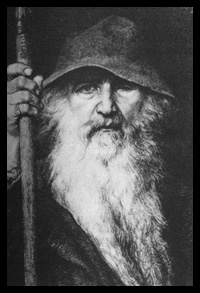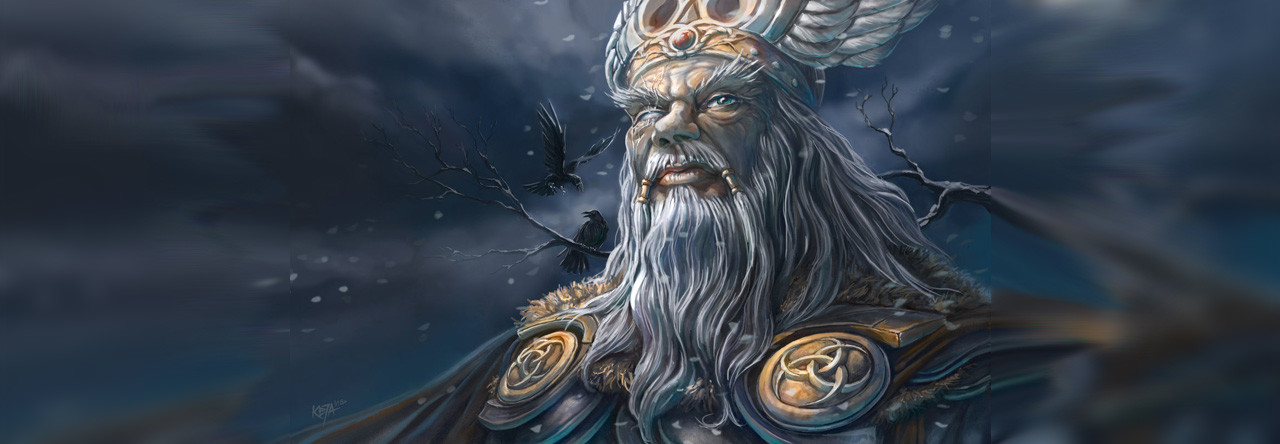 Odin or, depending upon the dialect Woden or Wotan, was the Father of all the Gods and men. Odin is pictured either wearing a winged helm or a floppy hat, and a blue-grey cloak. He can travel to any realm within the 9 Nordic worlds. His two ravens, Huginn and Munin (Thought and Memory) fly over the world daily and return to tell him everything that has happened in Midgard. He is a God of magick, wisdom, wit, and learning. In later times, he was associated with war and bloodshed from the Viking perspective, although in earlier times, no such association was present. If anything, the wars fought by Odin exist strictly upon the Mental plane of awareness; appropriate for that of such a mentally polarized God. He is both the shaper of Wyrd and the bender of Orlog; again, a task only possible through the power of Mental thought and impress. It is he who sacrifices an eye at the well of Mimir to gain inner wisdom, and later hangs himself upon the World Tree Yggdrasil to gain the knowledge and power of the Runes. All of his actions are related to knowledge, wisdom, and the dissemination of ideas and concepts to help Mankind.
Odin or, depending upon the dialect Woden or Wotan, was the Father of all the Gods and men. Odin is pictured either wearing a winged helm or a floppy hat, and a blue-grey cloak. He can travel to any realm within the 9 Nordic worlds. His two ravens, Huginn and Munin (Thought and Memory) fly over the world daily and return to tell him everything that has happened in Midgard. He is a God of magick, wisdom, wit, and learning. In later times, he was associated with war and bloodshed from the Viking perspective, although in earlier times, no such association was present. If anything, the wars fought by Odin exist strictly upon the Mental plane of awareness; appropriate for that of such a mentally polarized God. He is both the shaper of Wyrd and the bender of Orlog; again, a task only possible through the power of Mental thought and impress. It is he who sacrifices an eye at the well of Mimir to gain inner wisdom, and later hangs himself upon the World Tree Yggdrasil to gain the knowledge and power of the Runes. All of his actions are related to knowledge, wisdom, and the dissemination of ideas and concepts to help Mankind.
Odin can make the dead speak in order to question the wisest amongst them. His hall in Asgard is Valaskjalf (“shelf of the slain”) where his throne Hlidskjalf is located. From this throne he observes all that happens in the nine worlds. He also resides in Valhalla, where the slain warriors are taken.
Odin’s attributes are the spear Gungnir, which never misses its target, the ring Draupnir, from which every ninth night eight new rings appear, and his eight-footed steed Sleipnir. He is accompanied by the wolves Freki and Geri, to whom he gives his food for he himself consumes nothing but wine. Odin has only one eye, which blazes like the sun. His other eye he traded for a drink from the Well of Wisdom, and gained immense knowledge. On the day of the final battle, Odin will be killed by the wolf Fenrir.
Just as a point of curiosity: in no other pantheon is the head Deity also the God of Thought and Logic. It’s interesting to note that the Norse people set such a great importance upon logic. The day Wednesday (Wodensdaeg) is named for him.

First Isa
It’s partially touched upon but largely overlooked that in later times when he became associated with battle and war Odin was also termed “Oath-breaker” Although largely there is no reason found in the myths for the name a lot of scholars believe this is a result of Odin being the patron deity of the berserkers. Given that many Berserkers were able to continue fighting with their characteristic ferocity despite grievous wounds until the battle was over and the shock set in and killed them it’s a plausible explanation for this name. A Berserker would pray to Odin for protection and guidance, make their sacrifices and go into battle, often doing more damage than any normal man on the battlefield, The amount of adrenalin and endorphins pumping through their bodies making them nearly unstoppable until the battle was over and the bodies chemicals receded leaving them to feel the pain and damage of their wounds, in their mind Odin abandoned these people who were loyal followers hence he “broke” the oath of the gods to watch over men..
DJ Fox
Thanks. This was WAY more help than Wikipedia. Even though I just wanted to know what Greek god Odin represented for fun, this was a lot of help!
Eden Smith
I looked it up and magic has been spelled like this forever.
Joe
I’ve seen the word…”Magick” spelled this way and yes, it is because it is to differentiate it from stage magic which is doing tricks.
Jesperado
The word magic has not been spelt that way “forever”, nor is spelling it magick incorrect. Aleister Crowley coined the term “magick” under that spelling to differentiate high magic or ceremonial magic from what he referred to as stage “magic” or common parlor tricks and illusions. The word magic itself derives from the French word magique, which was derived from the Latin words magicus/magika. The Latin words were derived from the Greek term Magike Tekhne which roughly translates to art of a magus. Quibbling over the spelling of the word now seems strange when either spelling is accepted, those most commonly it will still be seen spelt magic.
Not to revive a dead post, but I thought that needed some clarification.
Sophia A.I
Odin is Mercury aka Hermes aka Thoth…Odin is Wednesday in Spanish is Miercoles (Mercury).
J-Dubb
Reviving a very old post here but wanted to add that Odin being named an Oath-Breaker was likely due to his nature as a sly god who often broke some of the most sacred rules of the gods. He was even said to have been exiled from Asgard. He was not above breaking an oath or slaying a loyal follower to get what he wanted. He was god of sacrifices and god of outcasts. He was even criticized by Loki for causing the unworthy army to win a battle so that his favored warriors could join him in Valhalla. Odin was not above doing what it takes if the outcome was what he desired. Hence the title of Oath-Breaker. 🙂
Hilary Alexandra Stansby
The story of Odin hanging on Ygdrassil and being speared in the side before returning to life with additional knowledge 9 days later is so similar to the Christian story of the crucifixion that I wanted to know which came first. Is there any pre-Christian literature that could answer that?
Norman
I would recommend Joseph Campbell’s “Hero with a thousand faces”. He found similar story lines in almost EVERY culture and has cataloged them all.
Aaron Bredon
Odin was called Oath-Breaker because he broke the most sacred Oath of Blood Brotherhood with Loki 3 times, thus causing Ragnarok, the doom of the Gods.
All Odin had to do to keep his Oath was subject himself to suffer the same punishments that Loki did. He didn’t, abd thus caused his own death and the death of all his people.
Ami C.
My son is into this… I’m doing a bit of research…is this a “religion “? It seems like it’s just pretend or fictional characters based on old mythology…reading recommendations please.
Melissa L
All mythology was originally a religion or tied to one. Some of these actually are still practiced in smaller numbers, today. As for Norse mythology reading, There’s The Prose Edda, or there’s also a YouTube Channel called “Overly Sarcastic Productions” that summarizes myths from multiple cultures and religions, including Norse. It also has some nice history videos, as well.
artemis squids
It is a religion but most people regard it as only myths! If you wish to look into the religion it’s called Norse Paganism. However, this doesn’t mean your son is interested in the religion, he could just be interested in the myths. As for reading recommendations, there’s many great books out there that cover the hundreds of Norse myths that there are! Also, you should be sure it’s Norse mythology if you haven’t already, it can be pretty awkward to learn so much about it and then learn your son was actually interested in say.. Egyptian mythology or Greek mythology. You know?